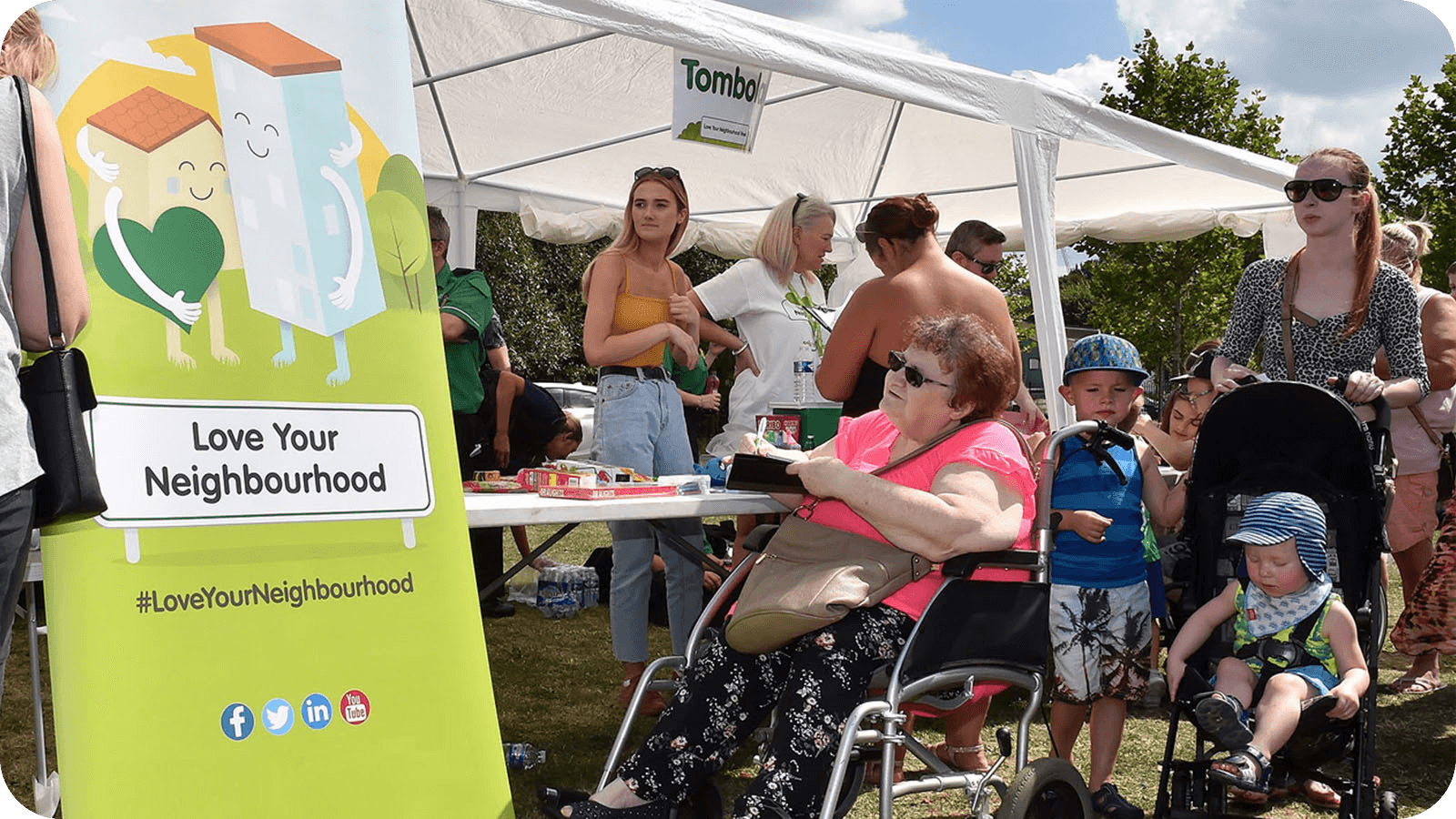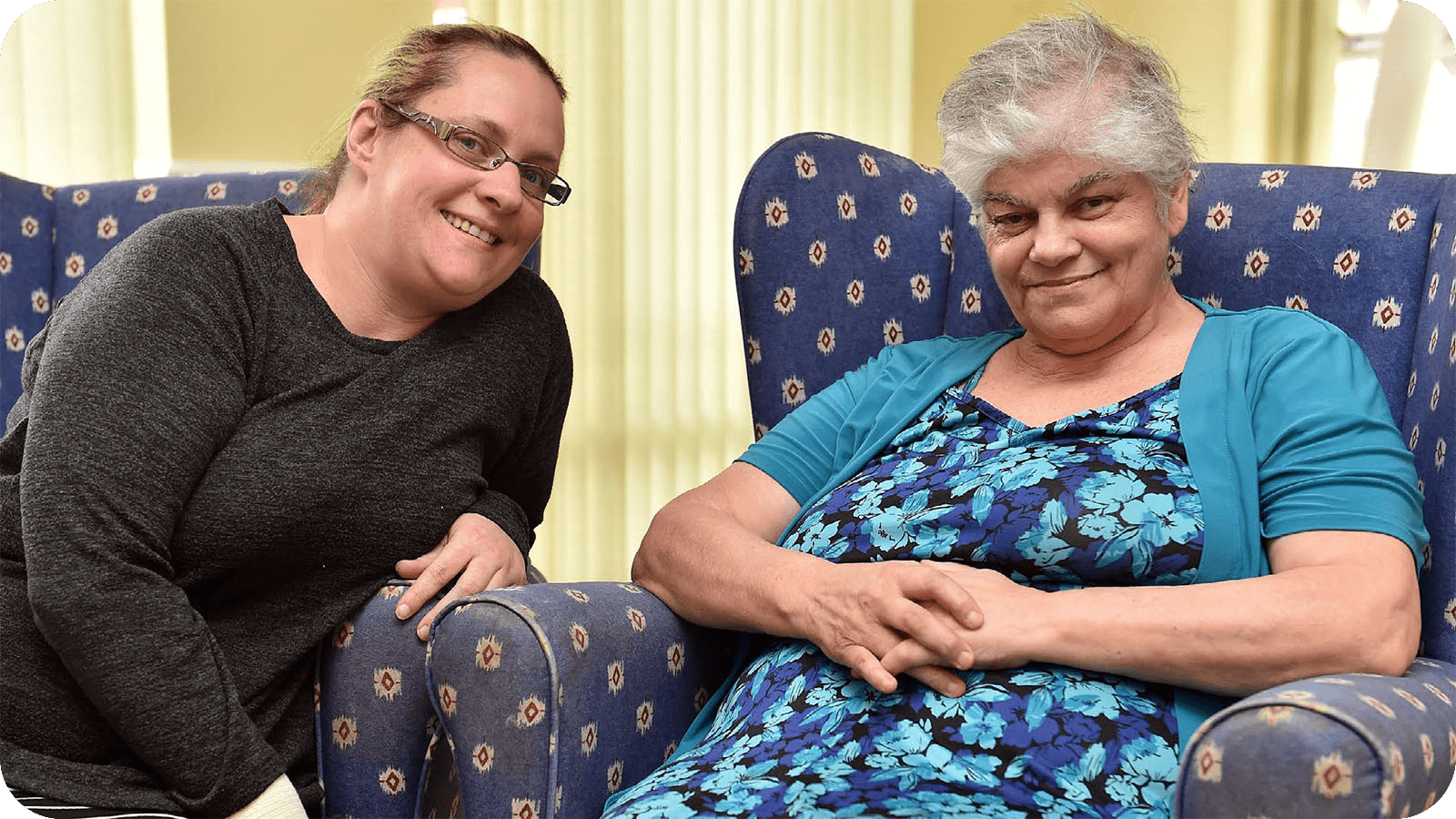3. Our Customers
 3.1 We recognise that a higher level of deprivation within a community often corresponds to a higher level of vulnerability for those who live within them. The communities where our homes are located, and the experiences of these communities, therefore have an influence on the services we provide and the decisions we make.
3.1 We recognise that a higher level of deprivation within a community often corresponds to a higher level of vulnerability for those who live within them. The communities where our homes are located, and the experiences of these communities, therefore have an influence on the services we provide and the decisions we make.
3.2 We have robust processes and schemes in place to support customers who may be experiencing financial difficulties, as the following assessment for 2022/23 demonstrates:
• £75,458 of benefits and grants gained for customers.
• £30,000 given to customers through our customer support fund, helping 127 customers.
• £25,000 of energy vouchers issued.
• 159 free sim cards issued.
• 386 customers supported with furniture packages.
• 436 referrals made to third parties for specialist support.
3.3 We will continue to provide access to financial support where possible and appropriate to do so.
3.4 The current national housing crisis has been well documented. We know that those who do not have access to an affordable good quality home do not have the security that this can bring, which makes it much more difficult for them to achieve other things in life such as good health, a good education, and a good job.
3.5 The 2021 Census has highlighted that in the last decade Salford has experienced significant population growth (36,000) and household growth (11, 561), which due to the limited social housing available, has been met almost entirely by the private sector. The quality of homes and services provided by private sector landlords has come under intensive scrutiny in recent years, and like others we have been concerned about the standards experienced of those who live in homes provided by the private sector.
3.6 To help improve this situation, we have been active participants of ‘Let Us’ the Greater Manchester Ethical Lettings Agency which works with landlords to maintain standards and let homes at affordable rents and ensure that those homes meet these standards.
3.7 We have also been involved in the development of Greater Manchester’s The Good Landlord Charter which is intended to be the first of its kind. An ambitious new voluntary standard for landlord excellence intended to support and work with landlords to achieve higher standards.
3.8 Our ambitions to lessen the impact of the current housing crisis cannot be met alone, and we are therefore proud to support Greater Manchester’s plans to become the UK’s first housing first city region. This will bring together a broad range of interested and crucial stakeholders to develop a strategy to drive up standards and availability, supported by funding from the new flexibility granted to Greater Manchester as part of the single settlement with government.
3.9 However, with almost 5,500 people on the housing waiting list in Salford, there is simply not enough social housing available for those who need it. The housing crisis and availability of truly affordable homes therefore remains a concern and building new affordable housing has long been a priority for us.
3.10 Of those waiting for housing in Salford, 76% are seeking 1 or 2 bed properties. Since 2015, we have built or acquired new homes and the vast majority of which have reflected this demand. In doing so we have been innovative, making use of disused buildings, as well as developing new, which has enhanced our communities and promoting eco-friendly solutions which are greener and more energy efficient, supporting customers to better manage their energy costs. Recent accreditation to the SHIFT, the sustainable standard for the housing sector to gold level, is recognition of the good work we have undertaken to reduce fuel poverty and improve financial resilience of customers. Our aim is to continue to deliver a minimum of 100 new homes each year.
3.11 The homes we have built, and are intending to build, have been designed and developed with current and future customer needs in mind.
3.12 The latest housing waiting list in Salford identified 467 applications for accessible housing, the vast majority of these were for 1 or 2 bed housing. In recognition of the limited access to accessible housing for people with disabilities we have recently established 4 new wheelchair accessible homes in our Greenhaus development. All new homes are informed by the concept of a home for life and are built to make future adaptations easier to accommodate.
3.13 Further, we know that some of the homes that would be suitable for families are currently under-occupied by older customers who have remained and are alone in what was their family home. There is, understandably, resistance to moving from a longstanding home with many memories, however, often these homes no longer meet the needs of the individual and can be more costly to run.
3.14 In response to this, a new and improved older persons offer is being designed which will involve 5 key estates across Salford. The first of these developments is planned for Arrow Street in Lower Broughton and will include a doctor’s surgery on the ground floor. It is intended that these homes will be attractive to older people who are under-occupying larger homes and support the redevelopment of our existing over 55’s independent living schemes, and as they move into these new more appropriate properties, the original homes can be let to those who are seeking larger accommodation.
3.15 Our EDI Commitments in 2024/25 to further this agenda are to:
• Continue to inform the development of the Greater Manchester (GM) Good Landlord Charter in 2024.
• Continue to inform the development of GM plans to become a housing first city region.
• Deliver a minimum of 100 new homes a year.
• Firm up our plans for our older persons housing offer.

3.16 A comparison of the 2011 and 2021 Census information shows an improved position in relation to health and disability. For example, 45.1% of Salford residents described their health as ‘very good’, an increase from 41.7% in 2011. Additionally, those citing as ‘bad’ decreased from 7.0% to 5.7%, and those citing ‘very bad’ decreased from 2.1% to 1.7%.
3.17 In terms of a positive impact on the community in relation to health and disability, one of the key actions we have been able to take as a housing provider has been the repurposing of Alexander Gardens as affordable housing for doctors, nurses and other clinical staff who work at Salford Royal Foundation Trust. This has supported them to fill vacancies where access to affordable housing locally has been a concern in attracting people to the area.
3.18 We have also undertaken an extensive programme to identify and address damp and mould within our properties. We have retrained all relevant colleagues and reviewed literature for customers following advice to make leaflets more accessible. Further, we have commenced a programme installing Switchee devices in our homes which are at higher risk, they provide data on energy usage, which in turn can allow insight into potential problems with damp and mould, allowing for a proactive management approach.
3.19 In terms of disability, Salford saw the third largest percentage fall in the Northwest for the proportion of residents who identified as being ‘disabled and limited a lot’, 13.3% in 2011 to 10.3% in 2021.
3.20 However, this position is not reflective of our experience, as there has been significant demand for aids and adaptations. In 2023/24 alone, we invested over £500,000 in aids and adaptations. This is a significant investment, but one we know is important in enabling our customers to remain in their homes for longer and continue to be part of their local communities, which are often the source of established and familiar support networks. The demand for this service shows no sign of abating, therefore we are exploring with Salford City Council how this could be funded in the future to support us to meet the volume of requests we receive.
3.21 To make the process of minor adaptations easier and quicker there is no need for an occupational health referral. However, we want to be assured that there are no barriers to access and therefore will undertake research to better understand the experiences of customers.
3.22 Our EDI Commitments in 2024/25 to further this agenda are to:
• Continue with our commitment to allocate a budget towards the adaptation of properties over the next three years, working collaboratively with Salford City Council and Greater Manchester Housing Partnership (GMHP) on a new approach to adaptations standards.
• Further review our Aids and Adaptations Policy using insights from customer experiences.

3.23 We know that overcrowded homes can result in children spending less time in the home, this can make neighbourhood management more challenging, particularly where there are limited affordable activities for young people to engage with. We have in the past provided holiday club activities, which whilst beneficial have not been of a scale or frequency to make a notable impact.
3.24 To improve the difference we can make, we have recognised the need to work with external partners for a more sustainable solution. Salford City Council has recently approved the building of a new multi-million-pound Salford Youth Zone, which is expected to open in early 2025. This facility will provide young people with somewhere safe to go, something positive to do and someone trusted to talk to. We have been asked to become a patron of the Salford Youth Zone, this means that beyond the financial support, our patronage would also provide us with the opportunity to directly engage with young people, invest in the community and build connections.
3.25 We also recognise the added disadvantage that care leavers can experience. We have signed up to a set of Greater Manchester care leaver pledges and committed to a number of actions, but are now exploring whether The Hive can be repurposed for shared independent living, which could include dedicated housing for care leavers to provide additional support. The Hive as an affordable housing solution launched in 2017 that was initially aimed at those aged between 18 and 25, this was the first of its kind in Greater Manchester and among only a handful in the country who provide a similar offer.
3.26 Our EDI Commitments in 2024/25 to further this agenda are to:
• Become a patron of the Salford Youth Zone.
• Review the future of The Hive.

3.27 At Salix Homes, we are committed to providing first-class services that put our customers at the centre, and our Customer Services Strategy 2024-27 sets out how we will continue to achieve this. Included in this, as a central pillar, are the new consumer standards, which require the treatment of all customers with fairness and respect, considering their diverse needs in the design and delivery of services.
3.28 This has long been a priority for us and, most recently, has been evident in the use of insights from analysing customer journeys within our processes to streamline services and trigger the launch of a ‘root and branch’ review of our repairs service, which incorporates the diverse nature of our customer base.
3.29 We have also established a team dedicated to complaints handling, which promotes respect and the rights of customers within the management of complaints, and captures learning that is shared throughout the organisation to improve services. This is now supported by a regular review of complaints using customer demographic information to understand whether different groups have different experiences of our services.
3.30 To better respond to individual vulnerabilities and enhance the service we provide, it is essential that we hold this relevant information in our systems for our colleagues to act on. We have also started a journey to better understand who is in our properties through tenancy audits and collating ‘Getting To Know You’ census data, neighbourhood days and a high rise month of action.
3.31 Based on the information collected, the following is a summary of our customer profile:
• 56% female and 44% male.
• 28% of customers are over 60 years old.
• 15% have informed us that they have a disability.
• 71% of customers have declared their ethnicity as White British, the remaining 29% citing other ethnic groups.
3.32 There are gaps in our data; therefore, as part of our Customer Service Strategy, a strategic objective is to gain accurate insight into our customers by collating information to provide tailored and reliable data-driven services that are fit to serve the diverse needs of our communities. To support this, we will continue to deliver our Getting to Know You campaign to collect data on customers and their needs and ensure changes are made to systems to make this data more easily accessible and reportable.
3.33 To be useful, this insight must translate into action. Vulnerability workshops with colleagues have identified the tools they need to respond effectively and consistently. Key documents, such as a Customer Vulnerability Policy and Reasonable Adjustments Policy, have been reviewed and introduced. We will continue this work and include a cross reference of Tenancy Satisfaction Measures with demographic information to again, understand if high levels of service provision are being experienced by different demographic groups, and the changes we make are being effective.
3.34 Ensuring our communication with customers is proactive, transparent, consistent, and compassionate to build trust, increase customer satisfaction and prevent avoidable contact by getting things right first time is another key strategic objective. Central to the delivery of this will be the review of current communication channels, including for those where English is not their first language.
3.35 This is particularly important as we are now operating in more ethnically diverse communities. Salford, like the whole of Greater Manchester, is becoming much more diverse in relation to its ethnic makeup. In the 2021 Census, 82.3% of people in Salford identified their ethnic group as ‘White’, compared to 90.1% in the 2011 Census. The Census data also showed that 6.1% of Salford residents identified their ethnic group within the ‘Black, Black British, Black Welsh, Caribbean or African’ category, up from 2.8% in 2011. The 3.3%-point change was the largest increase among high-level ethnic groups in Salford.
3.36 Data we hold about our customers indicates that 7% don’t use English as their first language.
3.37 Support is already in place to reduce barriers to communication, such as Language Line for translation services, Minicom for hearing impaired customers and tools on our website which can translate and improve accessibility of the pages and information held.
3.38 In addition to a review of potential language barriers, we will continue to take a customer-centred approach by listening to and learning from the wider customer voice within complaint handling and other sources of customer feedback. This further strategic objective helps to ensure our communication with customers is proactive, transparent, consistent, and compassionate. This will allow us to build trust, increase customer satisfaction and prevent avoidable contact by getting things right first time. This will include accessibility considerations to provide an effective customer service to all our customers.
3.39 Finally, we will empower our people with the knowledge and tools they need to provide customers with a high quality, positive experience when they interact with us. This will be delivered, in part, through new customer service training which will help equip colleagues to effectively use and recognise customer vulnerability. Where a customer’s vulnerability is identified as complex, colleagues will be able to refer them to a new Customer Support Team which will be established in 2024/25 and be dedicated to such cases.
3.40 Our EDI Commitments in 2024/25 to further this agenda are to deliver the following strategic objectives, as detailed in the Customer Service Strategy 2024-27:
• Gain accurate insight into our customers by collating information to provide tailored and reliable data driven services that are fit for purpose to serve the diverse needs of our communities.
• Ensure our communication with customers is proactive, transparent, consistent, and compassionate to build trust, increase customer satisfaction and prevent avoidable contact by getting things right first time.
• Taking a customer-centred approach by listening to and learning from the wider customer voice within complaint handling and other sources of customer feedback.
• Empowering our people with the knowledge and tools they need to provide customers with a high quality, positive experience when they interact with us.
3.41 Our Corporate Plan, Our Sustainable Future 2023-25, sets out our objective to support our customers and communities by ensuring a strong and influential customer voice through our customer engagement arrangements. Our Customer Engagement Strategy 2024-27 details that commitment.
3.42 Salix Homes has a strong track record of customer engagement and involvement. In 2020 we further developed our approach to customer voice and influence to ensure customers are at the heart of decision making. This included the establishment of a Customer Committee as a key part of our governance structure, with delegated responsibilities from our Board and representation on the Board through the chair of this committee. A new approach to scrutiny was also established with the support of a recruited pool of Customer Connectors from our community, who carry out this work and, together with the Customer Committee, make recommendations on their findings to inform service provision. To date, this has included six pieces of scrutiny including anti-social behaviour, repairs and customer service.
3.43 A number of specialist groups have been developed that sit under the Customer Committee and are chaired by committee members, this includes the Apartment Living Forum, a Complaints Oversight Group, and a Procurement Panel.
3.44 As a result of this work, we have seen increased customer satisfaction with being kept informed, rising from 79% in 2022/23 to 85% in 2023/24. We have also seen improvements in customer satisfaction that the landlord listens and takes customers’ views into account, with this increasing from 60% in 2022/23 to 77% in 2023/24.
3.45 We understand each customer has as much right as any other to participate in the decisions that affect the services they receive, and the strategy aims to provide customers with an ability to shape and influence the services we deliver, on matters such as the safety of their homes and how we spend their rent to deliver services and maintain and improve their homes.
3.46 Therefore, a strategic objective of this strategy is to develop our customer engagement framework to give customers the opportunity to shape what is important to them. One action is to publicise our customer engagement framework and menu of opportunities to ensure customers are aware of the different ways that they can share their views and influence services.
3.47 A further strategic objective is to collaborate with our communities to better understand the customer experience. Collaborating with community groups and networks helps us to reach customers who may not engage or who may face barriers to engagement, such as customers with disabilities, customers from ethnic minority backgrounds and young people. Therefore, we will map such organisations in Salford and make best use of partnership working to reach a wider range of customers with diverse needs.
3.48 As mentioned, it is important that we are able to listen to the views of all our customers, to support the final objective in this strategy is to continue to develop efficient ways of listening to customer-wide views through understanding surveys, sentiment, and trends. Through the provision and promotion of a range of different communication channels, barriers to providing feedback can be reduced. It will also enable us to ensure we understand where our ‘silence’ is, (meaning those customers who are less likely to engage with us) to better understand why this may be and what actions we may be able to take to improve engagement with this group.
3.49 Our EDI Commitments in 2024/25 to further this agenda, are to deliver the following strategic objectives as detailed in the Customer Engagement Strategy 2024-27:
• Develop our customer engagement framework to give customers the opportunity to shape what is important to them.
• Collaborate with our communities to better understand the customer experience.
• Continue to develop efficient ways of listening to customer-wide views through understanding surveys, sentiment,
and trends.

1. Introduction
An outline of how we'll ensure the provision of an inclusive working environment.
Introduction
2. Salix Homes - In Context
An overview of the setting and city our organisation works in.
Salix Homes - In Context
4. Our Colleagues
Creating working environments where everyone can feel safe and a sense of belonging.
Our Colleagues
6. Monitoring and Review
A summary of our EDI commitments and how we're monitoring progress.
Monitoring and Review